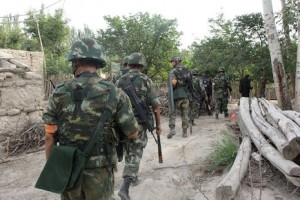China extends Xinjiang crackdown, announces stricter measures
UCA News, 26 January 2015
Beijing – China has extended a crackdown on terrorism that rights groups say has led to harsh restrictions on religion and other freedoms with few signs of actually curbing separatist violence in restive Xinjiang.
The announcement will see the government’s “strike-hard” campaign extended beyond the end of May until at least the end of the year, the state-run China Daily reported on Friday.
“We have the responsibility to stay on high alert and strike hard against terrorist activities in the region,” Xinjiang army Commander Peng Yong was quoted as saying in another report announcing further military reinforcement.
Officials in Xinjiang have announced a host of stricter measures this week during a regional People’s Congress that has largely focused on tackling separatist violence.
Data released from the meetings showed that criminal arrests in the region nearly doubled last year to more than 27,000 after the strike-hard campaign was launched by President Xi Jinping in late May following an attack on a market in Urumqi.
As part of its response, the government has poured extra troops into Xinjiang, held China’s first mass trials since the 1990s, fast-tracked convictions — and executed increasing numbers of minority Uyghurs on terrorist charges, prompting an outcry from rights groups.
“We’ve shortened the time between approving arrests and prosecution in major terrorist-related cases so the suspects can be tried as soon as possible to show the region’s determination to fight terrorism in accordance with the law,” said Nixiang Yibulayin, Xinjiang’s chief prosecutor.
Officials claimed this week that the harsh campaign was proving successful. But rights groups and analysts have questioned Beijing’s assessment.
Although attacks in western China slowed in the few months after the May campaign began, reported fatalities in Xinjiang point to a continued escalation, mainly around the predominantly Uyghur city of Kashgar.
In the most recent violence, security forces this month shot and killed six men carrying explosives outside of Kashgar, according to state media.
“If your measurement is the number of attacks, then I would say no, it’s not achieving its desired result,” said William Nee, a Hong Kong-based China researcher at Amnesty International. “But it’s so difficult to measure.”
Assessing the situation in Xinjiang has become increasingly difficult in recent months. Authorities have reportedly shut down the Internet and international phone lines more frequently. Also, Uyghurs inside Xinjiang have become more fearful of talking to people outside of China, said Nee.
Meanwhile, security forces have forcibly closed hundreds of religious schools, and this month authorities banned residents from wearing burqas.
“When it seems as if the Chinese authorities have done all they can to refuse Uyghurs basic liberties and freedoms, officials find a new way to exacerbate the tensions in the region,” said Alim Seytoff, director of the Uyghur Human Rights Project.
The central government has maintained it needs to take pre-emptive measures to fight a growing terrorist threat. Recent reports suggest that Xinjiang extremists are heading to the Middle East to fight with the Islamic State.
China is currently circulating a draft terrorism law — expected to be passed by the end of the year — which the government says will help tackle the problem.
But again, rights groups have warned that, as it stands, the bill would further erode freedoms due to vague wording that means almost any religious act could be classed as a terrorist act.
One section of the draft states that “forcing minors to take part in religious activities” constitutes terrorism.
“While terrorism poses grave threats to society, overboard and abusive counterterrorism measures can also inflict grave harm and exacerbate conflict,” New York-based Human Rights Watch said in a statement on Tuesday, criticizing the draft law.
“Harsh measures that conflate political or religious dissent with crime discourage ordinary people from trusting or cooperating with law enforcement agencies.”
http://www.ucanews.com/news/china-extends-xinjiang-crackdown-announces-stricter-measures/72858


